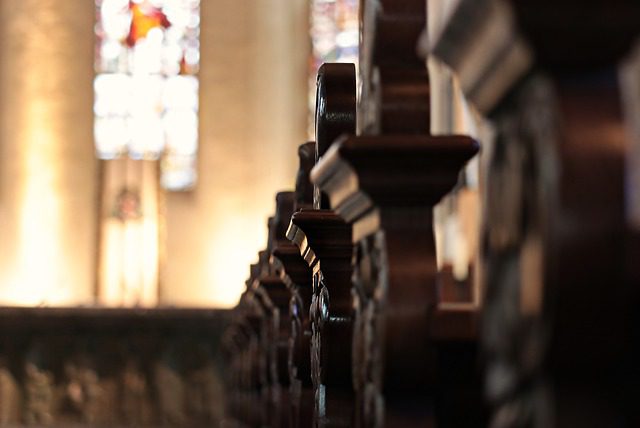I heard a collective sigh go up this morning, as clergywomen across America read the New York Times piece about Rev. Dr. Amy Butler and the Riverside Church–and all together breathed a litany of “yes,” and “sounds about right,” and “me too, sister.”
We’ve all been there. It is a story as old as the gospel itself. No, older. Because men have held power over women in most social systems for as long as the human memory can stretch.
And whether we sigh our truth into the computer screen or shout it into the void, the truth remains: many churches allow women to be ministers. But
I count myself lucky. I won’t say I’ve never experienced sexism in the church; but I have never been harassed to the point of feeling unsafe, or put in a position where I feared for my job if I spoke up. Most of the misogyny that’s come my way in ministry has come from outside of the congregation: a visitor just there for a wedding; a leader in the local community; or a real asshole of a funeral director. That sort of thing.
I’ve also dealt with the occasional church member whose personal space was a little too close; whose hands wandered into the boyfriend zone during an after-worship hug; the stray comment about ‘how nice it is to see what you look like under that robe.’ I mean, ew. But also, manageable.
In those situations, I almost always decided not going to make a thing of it. However–and here’s the important part– I always knew that if I needed to make a thing of it, I would have the support of my congregation. I felt there was an invisible force field of protection around my person, and my authority as a pastor. I felt protected from the uglier expressions of misogyny, because people had my back.
One might also call that a cloud of witnesses.
I can’t comment on the particulars of what went down a The Riverside Church, because I wasn’t there; and that is not my story to tell. But it does point to a larger liability of the “progressive” church, the communities that have staked their mission and identity on empowering women, being diverse and inclusive, and lifting up voices that have otherwise silenced in the name of tradition. Too often, those churches think they have “moved beyond” the effects of patriarchy on their ministry. Much like folks who think they have “moved beyond” racism; or homophobia; or any other number of social issues where progress is desperately needed. The Church, like the rest of society is divided between those who want to dig in their heels and resist change at all cost; and those who think they’ve already changed– and therefore resist real transformation.
In other words: sometimes our churches want to make change. But they don’t want to be changed.
Many churches have progressive values; but often, that manifests as a passive sort of welcome that costs nothing. Include gay people in the church? Sure! As long as they don’t make us uncomfortable and “get in our faces” about equality, or want us to get political or something. Racial diversity? Great! We love people of color! But start talking about white privilege and what it might take to bring about true equality and things get dicey.
Young people in leadership? Excellent! As long as they keep doing things the same way we’ve been doing them.
A woman pastor? You bet. Bring her on. Just… you know, make sure she knows how to be passive and not make a big deal if men treat her the way men typically treat women in power. As long as she can go along to get along.
Maybe this is less a question about sexism, at the surface level, and more conversation about the cost of discipleship. Rev. Dr. Amy Butler paid the price of patriarchy because her church was not willing to bear the cost of change with her. Like many other churches before them, they weren’t even willing to pay their part of the tax. While I feel solidarity with Rev. Butler, I also grieve for the church itself– this community has lost a significant voice of leadership because they could not, in the end, pay the price of true transformation.
What it really costs to be the Body of Christ is to sometimes put our own bodies on the line for another. Or, at the very least, let go of the comfort of what we know, who we’ve been, and how we’ve moved in the world.
What it means to be “progressive” is to be a catalyst for progress. What it means to be “Christian” is to be a follower of Christ. We who call ourselves both “progressive” and “Christian” need to decide how prepared we are for progress that moves us away from traditional power centers and the security they offer; and if we are willing to follow in the way of Jesus– who gave his very life, when it came down to it, instead of bowing down to that other power.
While the Church often positions itself as guardian of white male privilege, I believe strongly that the gospel actually holds the key to smashing the patriarchy. I believe that so strongly I wrote a book about it. You’d think a story like the one we heard today would diminish that belief, discouraging other women from speaking when they are silenced. On the contrary, it’s hopeful that this story is getting so much exposure. A high profile church; a woman with a powerful voice; and a public reckoning with what it really means to be progressive and Christian in this very complex time in which we’re living. That reckoning is a blessed invitation to speak hard truths about who we invite to the table; and ask hard questions about whether or not we are truly ready to be transformed by the gifts they bring.
Let the collective sigh of clergywomen today energize us for another day of truth-telling that might set others free.

















